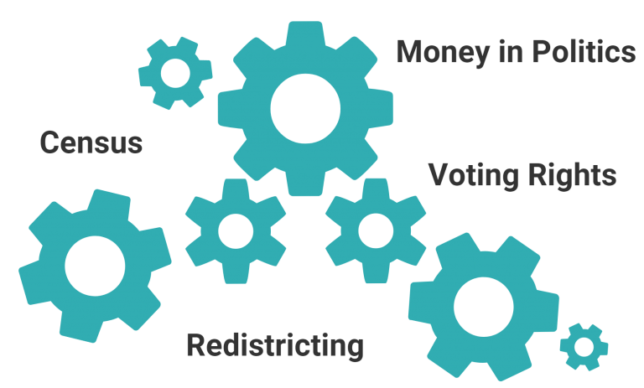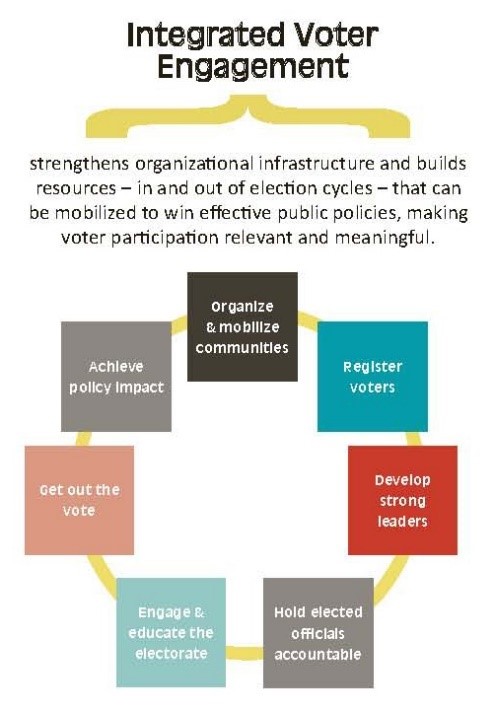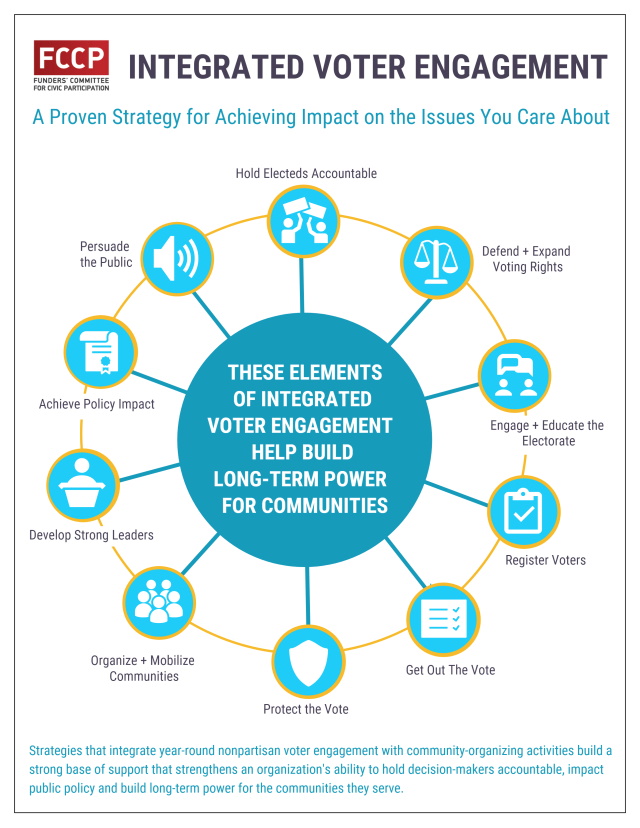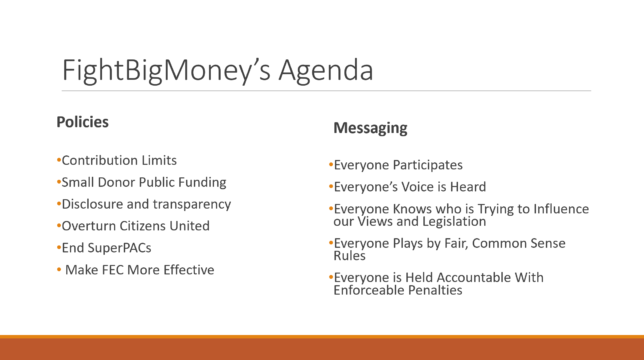Organization Trends
The Funders Committee for Civic Participation
 Credit: Funders Committee.
Credit: Funders Committee.

No single organization better illustrates the elite Left’s coordination ahead of the 2020 Census and 2021 redistricting effort than the Funders Committee for Civic Participation, an affinity group for major donors and foundations to synchronize the flow of money to leftist political nonprofits.
The Funders Committee isn’t itself a genuine nonprofit, but a front for NEO Philanthropy, a 501(c)(3) pass-through funder and leading “dark money” group that incubates new activist groups. As such, the Funders Committee doesn’t file Form 990 reports with the IRS. This project-sponsor relationship highlights the Funders Committee’s value to the Left—not as a grantmaker, but as a convener for donors to ensure their spending has the maximum impact on elections.
Funding “Civic Engagement”
The Funders Committee was formed in 1983 and boasts an impressive membership. The ranks of its 90-odd members include nearly every “dark money” funder on the Left as well as some of its biggest labor groups: Arabella Advisors, the Ford Foundation, the Rockefeller Brothers Fund, George Soros’s Open Society Foundations, eBay co-founder Pierre Omidyar’s Democracy Fund, the National Education Association, and the AFL-CIO. The Democracy Alliance, which performs a similar role to the Funders Committee as coordinator for other grantmakers, is also a member. Another member, Bauman Family Foundation, is headed by Patricia Bauman, a Democratic mega-donor who sat on the boards of Catalist (the Democratic Party’s data mine of choice), Democracy Alliance, and NEO Philanthropy itself.
As such, the Funders Committee is connected to nearly every prominent funder in left-wing politics. To give a sense of the amount of money involved, in 2016 alone their total combined expenditures exceeded $6 billion, according to their filings with the IRS.
The Funders Committee is headed by Eric Marshall, the former head of election activism for State Voices—a key voter-mobilization nonprofit—and manager of legal mobilization for the left-wing Lawyers Committee for Civil Rights Under Law. He’s also a board member for the Ballot Initiative Strategy Center, which tries to leverage the ballot initiative process in states to increase voter turnout.
The Funders Committee’s goal is increasing “civic engagement” by generating high voter turnout among traditionally Democratic-leaning constituencies. At the heart of this scheme is the group’s Integrated Voter Engagement model, a kind of flowchart for mobilizing voters “to win effective public policies.” The model is composed of seven stages:
- Organize and mobilize communities
- Register voters
- Develop strong leaders
- Hold elected officials accountable
- Engage and educate the electorate
- Get out the vote
- Achieve policy impact
In 2017, the group updated its Integrated Voter Engagement “wheel” to include more spokes:
- Defend and expand voting rights
- Engage and educate the electorate
- Register voters
- Get out the vote
- Protect the vote
- Organize and mobilize communities
- Develop strong leaders
- Achieve policy impact
- Persuade the public
- Hold electeds [lawmakers] accountable
This sounds more like politics than philanthropy, but for these groups it’s par for the course. Few would consider “achieving policy impact” a proper goal of a tax-exempt charity, yet under IRS rules a 501(c)(3) nonprofit may engage in activities such as voter registration or registration for the 2020 Census so long as it doesn’t cross into partisan politics—such as by registering only people who say they plan to vote for Republicans or encouraging voters to support Democrats.
The Funders Committee has called its model one of “the most effective ways to increase voter turnout,” and little wonder. In 2005, the Funders Committee targeted the Colorado Progressive Coalition for funding and organizing efforts using the Integrated Voter Engagement model. The result was thousands of new voters who helped the coalition suspend the Colorado Taxpayers Bill of Rights in a referendum, opening the floodgates to greater state spending. The next year the Colorado Progressive Coalition followed up with a successful ballot initiative campaign to raise the Colorado minimum wage. In 2008, the coalition struck again, using the Funders Committee model to defeat a ballot initiative barring race- and sex-based affirmative action.
No model can guarantee a political outcome, and the Integrated Voter Engagement model by itself isn’t enough to convert Republican-held states into Democratic strongholds. But by targeting Colorado with a closely coordinated and well-funded campaign, the Left turned a battleground state into a reliably Democratic state—thanks to the systematic efforts of the Democracy Alliance and Funders Committee.
And they are applying the Integrated Voter Engagement model to other battleground states and longstanding Democratic Party targets: Florida, Nevada, North Carolina, Michigan, Ohio, Oregon, and Texas, to name a few. A 2012 Funders Committee report claimed that allied groups using the model registered “roughly 4.5 million people . . . over the last three election cycles.” As the group puts it:
Strategies that integrate year-round nonpartisan voter engagement with community-organizing activities build a strong base of support that strengthens an organization’s ability to hold decision-makers accountable, impact public policy and build long-term power for the communities they serve.
Four Pillars for Permanent Control
Put into practice, this comes down to manipulating four avenues toward building virtually permanent left-wing majorities in Congress and state legislatures:
- The 2020 Census,
- 2021 redistricting,
- Voter registration and litigation, and
- Campaign finance reform.
Taken together, the Left hopes to create an insurmountable advantage for Democrats in elections for at least the next decade and the 2030 Census. Funders Committee is actively working along two of these avenues.
Funders Census Initiative 2020. The Funders Census Initiative (FCI) is the working group focused on shaping the 2020 Census to fit the Left’s agenda, primarily by moving money from Funders Committee members to groups conducting GOTC (get-out-the-count) work to increase the count of Democratic-leaning constituencies across the country. As the Funders Committee puts it, “It is vital that grant makers get involved. The Census Bureau can’t do it alone.”
This effort began as early as 2013. In 2016, FCI released its 2020 Action Plan with three key goals: improving response rates, establishing state-based census projects to “mobilize constituencies,” and expanding the committee’s “universe of funders.” To that end, FCI counts a number of special interest groups in its ranks, including Van Jones’ Color of Change, the American-Arab Anti-Discrimination Committee, and National Congress of American Indians. Each of these groups has conducted message testing on minority groups to determine census response rates.
Color of Change, for example, ran messages targeting black communities with the message, “President Trump has actively worked to put down the Black vote and reduce outreach to Black communities for healthcare enrollment, and he will do the same when it comes to Black people taking part in the Census.”
Interestingly, the Bauman Family Foundation appears to play a lead role in FCI’s activities, including the Funders Committee’s efforts to counteract the Trump administration’s proposed citizenship question in 2020. In March 2018, Secretary of Commerce Wilbur Ross announced that the U.S. Census Bureau would ask respondents if they were U.S. citizens in the 2020 census, immediately sparking furor from the Left. The Center for American Progress accused the Trump administration of attempting to “rig the census for partisan political benefit,” claiming the question would scare recipients into not responding.
In response to Wilbur’s announcement, the Funders Committee launched an “emergency briefing” led by the Bauman Family Foundation and three interest groups: Leadership Conference on Civil and Human Rights, National Association of Latino Elected and Appointed Officials (NALEO), and Asian Americans Advancing Justice. In August, over 300 grantmakers, including numerous Funders Committee members, signed a letter to the Commerce Department urging it to withdraw the citizenship question. (Bauman executive director Garry Bass was listed as the letter’s contact.) While the Funders Committee itself was not a signatory—NEO Philanthropy was—the group published letter templates for other groups to sign and send to the Commerce Department. After months of deliberation in the courts, the Trump administration decided not to include a citizenship question in the 2020 Census.
Little wonder, then, that its efforts have received hearty praise from leading Democrats. In 2015, then-Rep. Keith Ellison (D-MI) delivered the keynote address at the group’s convening in St. Paul, Minnesota, held in preparation for the 2020 Census. Then-Sen. Al Franken (D-MN) told viewers how important the census is in “determining how many seats in Congress are allocated” in a video made specifically for the event:
I know you’re working hard to make sure that the upcoming 2020 census goes smoothly, and gives a clear, accurate snapshot of our country. I commend your foresight—the census is very important and it’s critical for us to get ready now, even though the census is still a few years away.
Money in Politics. Money in Politics is a Funders Committee working group based around a decade-old goal: overturning the U.S. Supreme Court’s ruling in Citizens United v. FEC (2010), which found that government efforts to restrict outside spending (independent expenditures) unconstitutionally violates Americans’ First Amendment free speech rights. According to the Money in Politics working group, the Supreme Court’s decision “dismantled longstanding protections against undue influence in politics” and exacerbated the “increasing impact of big, secret money in politics”—ironic, given the billions of dollars that Funders Committee members have poured into politics.
Most of the working group’s actual operations are done in secret, but it does make known its goals of funding state ballot initiatives (presumably to roll back donor privacy laws) and “jurisprudence strategies to engaging conservatives and the New American Majority,” likely meaning lawsuits to overturn voting integrity laws.
In 2016, Money in Politics released a slideshow presentation laying out its short- and long-term strategies as part of its FightBigMoney campaign. Those goals are coupled with talking points for members to use when selling their policies to the public, such as the Orwellian idea that limiting the amount of money Americans can donate to campaigns and PACs means that “everyone participates.” The rest of the strategy hinges on getting ideological judges appointed to federal courts:
- “Provide future [Supreme Court] justices who are open to new frameworks”;
- “Strategic litigation that employs these new theories and helps transform the law”; and
- “Raise the profile of money in politics as one of the key issues nominees to the Supreme Court and lower courts may be called upon to address.”
The slideshow also listed the campaign’s sponsors, each of which is a leading litigator-activist group:
- Brennan Center for Justice,
- Common Cause,
- Democracy 21,
- Democracy Matters,
- Demos,
- Every Voice,
- Free Speech for People,
- Issue One,
- People for the American Way,
- Public Citizen,
- Represent.Us, and
- U.S. Public Interest Research Group (US-PIRG).
Conclusion
What the Funders Committee for Civic Participation represents is the professionalization of nonprofit politics. Few Americans realize that it’s this multi-billion-dollar nonprofit sphere—not the political parties—that increasingly influences the outcomes of elections and the future of public policy. But hardened leftists do, which is why they’ve taken advantage of nonprofits’ potent tax exemption and weaponized IRS rules concerning charities to build a vast political network surrounding the Democratic Party composed of legions of activists, lawyers, strategists, and mega-donors all sharing one goal: the fundamental transformation of America.






